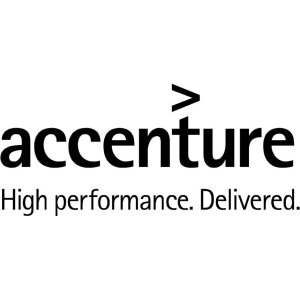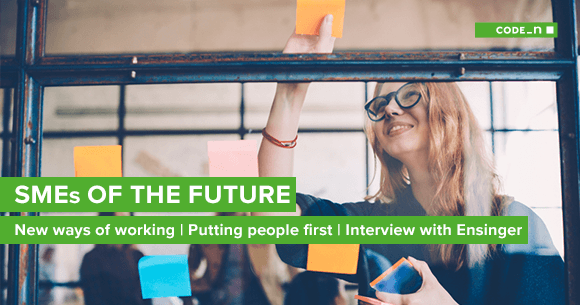Partner interview: Frank Riemensperger of Accenture about the Internet of Things
 CODE_n is the ecosystem for digital pioneers. More and more renowned partners will take part in this network – among others the CeBIT, EY, Salesforce, EnBW, TRUMPF and the international consulting company Accenture with the Smart Service Welt. We asked Frank Riemensperger, Country Managing Director of Accenture in Germany, about the motivation of Accenture and his view on the internet of things.
CODE_n is the ecosystem for digital pioneers. More and more renowned partners will take part in this network – among others the CeBIT, EY, Salesforce, EnBW, TRUMPF and the international consulting company Accenture with the Smart Service Welt. We asked Frank Riemensperger, Country Managing Director of Accenture in Germany, about the motivation of Accenture and his view on the internet of things.
Mr. Riemensperger, as Country Managing Director of Accenture in Germany and co-chairman of the Smart Service Welt working academy, you’re closely involved in the Internet of Things. We’re all certain that smart, networked systems and products will fundamentally change our lives and how we work, but which areas do you think will see faster development? And in what way can companies and consumers benefit from these developments?
Frank Riemensperger: Networking makes a lot of sense in every individual sector of industry. So I always say that “Every business is a digital business.” If you analyze the digital data, some exciting business models emerge, whether it’s a retail outlet, an automotive company, a producer of agricultural machinery or an insurance company. If you examine the value chain, we can see a shift as companies move away from products toward downstream service provision. One thing this makes me think of is “Smart Services.” These are based on the evaluation of digital data gathered from smart products.
The advantage this brings for customers is that they receive offerings that are tailored to their requirements, so they’re of actual benefit. This opens up new sources of revenue for companies, simply by analyzing user data. Until now, the value they added came to a halt when the product came off the production line. In the future, producers will earn money at all stages of the life cycle. But all of this will only function if we develop cross-industry software platforms to evaluate the data.
Also, we have to convince consumers that networked products and services will actually make their lives better. There’s widespread skepticism at the moment because of all those “data leeches” apparently out there doing things with user data. We have to get people enthusiastic about such data-protected services and clearly name the benefits. Just think about driverless cars, which will make traffic safer, or networked health care, which will make it easier to diagnose patients and improve treatment.
How important do you think startups are for this development?
Frank Riemensperger: Businesses have a lot to gain by being open to the innovative ideas of young entrepreneurs. Especially with isolated innovations – by which I mean innovations for a really specific problem. Without the creative thinking of startups, we won’t break the mold. They often come at things from a different angle, they approach complex challenges in a completely different way compared to established companies. Although to be fair, I have to say lots of big companies have now become much more agile in R&D. Many of them have set up their own think tanks within the company, with small, autonomous task forces and lean structures highly reminiscent of startups.
But for me the future lies in open innovation. Lots of companies have now understood the benefits of collaborative innovation projects and close exchange with startups, scientists and their customers. For me this is work-sharing in the best possible sense. The startups bring unorthodox thinking to the companies, and, in return, the companies offer access to hitherto jealously guarded product information and studies.
Startups are also dependent on bigger partners when it comes to implementing the new solutions. It doesn’t cost much to develop a data-based service, all you need is a good idea and a couple of programmers. But carrying out research on a new technology and getting it market-ready not only requires a lot of capital, it also takes comprehensive know-how.
In the future, billions of people and objects will be connected to one another, resulting in previously unfathomable dimensions of complexity in terms of data and processes. How can this be managed?
Frank Riemensperger: What’s really critical to success is how to identify the interesting patterns in the volumes of data, and how to use this to create helpful applications for users. That’s precisely the reason why we call these solutions smart services. We now have modern analytical tools and these can evaluate millions of data points in real time and link up information. This is an important foundation stone for autonomous systems – things like smart factories or driverless cars – but also in particular for using this data to develop new concepts, creating innovative service models that go with the smart, networked products. Despite this, we have to ensure that there are clear rules on what we do with user data, not only to safeguard data protection but also so that third parties can still carry out evaluations.
Thinking about Industry 4.0, as everything becomes more and more digital, manufacturing companies face particular challenges. But thanks to new technology, it should be possible to network factory production with the outside digital world in the future. Are we still a long way off from this scenario? How will smart factories work exactly, and what will the benefits be to end customers?
Frank Riemensperger: When we’re talking about smart factories, this is a highly complex task and it won’t become a reality for another ten or twenty years at the earliest. Getting everything working together – production planning, automated machinery, sensor data being processed in real time, the IT infrastructure – it’s still a huge challenge for industry. Granted, a whole host of sensors are already being used in manufacturing and they’re gathering data in real time and making it possible to control some parts of production completely autonomously. But what we don’t have yet are the uniform data standards and the interfaces that are needed for all of the machines to communicate with one another or talk to the production planning systems. The IT companies and manufacturing companies are working on this at full speed, and in a good decade or so they’re bound to turn industrial manufacturing on its head. By that point we’ll witness a rush of smart products which will be fitted with lots of sensors and connections to the Internet. There’s huge growth potential in this for German industry, especially – in fact already – when it comes to developing Web-based service models, i.e., smart services, to go with the smart products when they leave the factory.






Write a comment